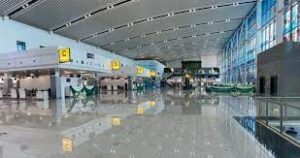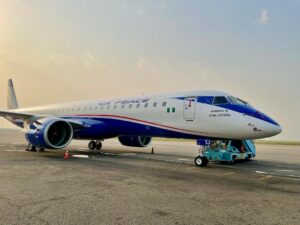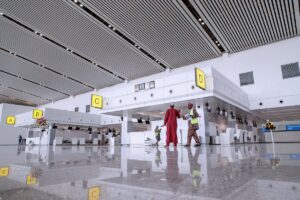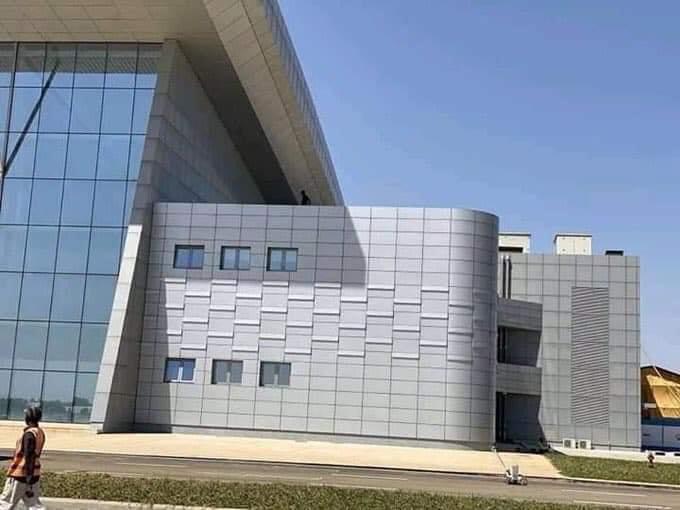
With the highest passenger traffic in West Africa, Nigeria ought to develop major airport infrastructure that takes advantage of its international, regional flight operations
One key advantage the Nnamdi Azikiwe International Airport, Abuja, has over all other airports in Nigeria is that it has virgin land for expansion. Playing second fiddle to the Murtala Muhammed International Airport, Lagos, which is the nation’s gateway, over the years, the Abuja airport had grown in traffic and has become strategic that certain realities are recommending that the federal government should reappraise its status, as the country prepares to take a leading role in air transport in the sub-region.
Benefiting from SAATM, AfCFTA
The Single African Air Transport Market (SAATM) is an initiative of the African Union to create a single unified air transport market in Africa to advance the liberalisation of civil aviation in Africa and act as an impetus to the continent’s economic integration agenda. SAATM will ensure aviation plays a major role in connecting Africa, promoting its social, economic and political integration and boosting intra-Africa trade and tourism as a result.
Nigeria can begin to take advantage of this market if it has the right airport facilities and the airlines with the right equipment, recognizing the fact that Nigeria had dominated the market before.
Former Managing Director of the Federal Airports Authority of Nigeria (FAAN) and currently CEO of Avialog Company Limited, Richard Aisuebeogun, once told THISDAY that there are huge opportunities in the West Coast with its over 390 million population. He said that is potentially a big market that has attracted airlines from other regions. And for any Nigerian airline to make money from the destinations in the sub-region, it must have to recognise and overcome the barriers, including ethno-political differences and protectionism and one sure way of going about it is to have state-of-the-art airport facilities, including transit facility where passenger from West Africa destinations could connect flights to long haul destinations. With existing Nigerian carriers and the right equipment, the country can maximise the benefits of SAATM.
“You can buy all the brand new airplanes but without solving some of these challenges you will experience what your predecessors experienced. The prevailing conditions that happened in the 90s and 2000s haven’t changed; they are still there. So, what is the guarantee that in the next 10 years you’d still be in the market?” Aisuebeogun queried.
Nigeria reluctantly embraced the African Continental Free Trade Area (AfCFTA), but with high population, robust domestic airlines and modern airport facilities, Nigeria can take advantage African Continental Free Trade Area. But this will not happen if there is no planned strategy with defined objectives to take advantage of the potential benefits at its disposal.
Opportunities for Growth
The Managing Director of Flight and Logistics Solutions Limited, Amos Akpan, observed that that government decision makers in the aviation industry may inadvertently be limiting the growth of the industry by certain policies they are introducing to guide the sector. He urged them to have broader spectrum for the industry by targeting to make the sector among the best in Africa, remarking that certain decisions being taken in the sector might have outcomes that would place Nigeria behind such countries like Egypt, South Africa, Ethiopia, Singapore, and Malaysia.
His recommendation is that government should concentrate on building an air transport hub for West Africa.
“Take one airport and upgrade the infrastructures and facilities to very high status with modern facilities. Every flight from every city in West Africa will come into that airport for connections to every part of the world. This is pivotal to the establishment, the growth, and sustainability of allied aviation businesses in Nigeria. Our international airports (Lagos, Abuja, Kano, Port Harcourt) are so limited that they can’t accommodate some wide-bodied aircraft. There are non-existing facilities for transit and connecting flights. We don’t seem ready to flow with the rest of the world,” he said.
Akpan also recommended that the Nigerian College of Aviation Technology NCAT), Zaria, should be given the attention in terms of infrastructures and facilities to train the skilled personnel to meet the industry manpower needs.
“I am not against the establishment of Aviation University as they are doing. I am advocating for NCAT to be enabled to train for the needs of our aircraft operators, handling companies, airports, airspace management, catering companies, logistics companies, tickets and passengers processing companies, cargo and courier companies. NCAT should be that vehicle to convey skilled personnel to field operations in the industry.
“There is the issue of the B737 simulator which was purchased and has been undergoing installation in NCAT. When will our pilots train with it? This is not a criticism but my way of pushing our system to achieve result on a worthy project,” he said.
Maintenance
Akpan said that Nigerian aviation cannot move forward without having comprehensive maintenance facility, where commercial airlines can conduct checks up to C-check. This is where the Maintenance, Repair and Overhaul (MRO) facility in Uyo comes handy. Although the Akwa Ibom state government has not apprised Nigerians on the profile of the facility, but it is obvious that it is a major maintenance organisation.
“The infrastructure is in Uyo, the work skills is in Aero Contractors. Harness Uyo infrastructure and Aero Contractors skill and grow both into an MRO that can provide world-class aircraft maintenance facility. My point is that we have to grow Nigeria’s own MRO and the start-up seeds have been sown in Uyo and Aero Contractors,” Akpan said.
Leasing Company
Akpan said that operators in the industry ought to access funds at single interest rates with tenure of 15 to 20 years. That is single digit, long-term credit facility. H explained that this is required by Nigerian airlines in particular to build capacity for international competition, noting that getting aircraft from Nigerian leasing company at international competitive rates would reduce financial load on Nigerian carriers.
On national carrier, he said, “I believe private investors should establish and operate world class airlines and allied businesses in the aviation industry. The government should provide support with infrastructures and influences at international arena.

“The government should provide policy frameworks that project and protect Nigeria’s tangible (visible) and intangible (invisible) assets. I am referring to traffic rights, commercial agreements, market size, category one certification and others.There should be support for carriers with Nigerian flag to perform like Emirates, Delta, KLM, Singapore, Qantas, Ethiopian and British Airways. Foundation and support columns are critical to a building that will stand for a long time through favourable and unfavourable weather,” he said.
Abuja as Major Hub
As stated earlier, while Lagos airport is currently the gateway and busiest airport in Nigeria, it has been encircled by the bustling city and there is no room for expansion. But the Abuja airport has room for expansion. It has grown over the years to have VIP facility, cargo facility, domestic terminal, international terminal and hajj terminal. What the airport may need now is transit facility for passengers travelling to sub-regional destinations.
The CEO of Aero Contractors, Captain Ado Sanusi, told THISDAY that Abuja could be a hub for West Africa and recalled that few years ago, the Lufthansa Group picked Abuja as its operational hub for West and Central Africa, noting that there is space at the airport for expansion.
“The good thing is that there is space for expansion at the Abuja airport. More infrastructures can be added. They can build transit facility and other things to make Abuja airport a hub. There are other important things that should be added. There should be shopping malls, duty free and free trade zone. We can follow the Dubai model and designate the area around the airport as free trade zone. Investors can come and build factories and open phone assembly plant or even garment factory. With that the place will become busy and a lot of activities will be happening there.
“Then we can build another runway. So that when one runway is closed the other will be receiving flights. Not that it is compulsory because the airport can really function with one runway, but it will be good to have a second runway. Heathrow, which is the hub airport in the UK, had one runway for a long time. There was even a time Heathrow was not operating 24 hours, just some years ago,” he said.
Speaking in the same vein, the former Managing Director of the Nigerian Airspace Management Agency (NAMA), Nnamdi Udoh, told THISDAY that there are many strategic factors that should make Abuja the operational hub for West Africa, noting that it is the headquarters of ECOWAS and also hosts the Banjul Accord Group Safety Oversight Organisation (BAGASOO).

“Abuja is Nigeria’s capital. It is strategic because it is located at the centre of the country, it qualifies as a hub, even with a single runway, but there is need to have a second runway. After all, Gatwick has one runway and it is a very busy airport after Heathrow. Nigerian aviation agencies are based in Abuja. If Abuja is the main hub, Lagos can be the second hub. Almost all the major airlines that operate to Lagos want to also operate to Abuja, except those airlines that do not have reciprocity in their Bilateral Air Service Agreement (BASA) with Nigeria. There is also multi-modal transport system at the Abuja airport, which include road, rail and air. The airport already has a rail station,” Udoh said.
However, travel expert and the organiser of Akwaaba African Travel Market, Ambassador Ikechi Uko told THISDAY that what determines airport as hub is facility, policy or population; that as it currently stands, Abuja airport cannot be a hub based on what is on ground but as a future plan, it can be designated as a hub.
He noted that Abuja airport does not have hotels very close to it; it does not even have banks and other things that could support tourism value chain. When compared to Lagos, he said that Lagos has these essentials like hotel, banks and other basics round it but getting out is difficult due to traffic gridlock.
“But as a future plan, Abuja will be a better place because it has softer ground, but Lagos is literally a war zone. Abuja is good for future plan for Aerotropolis, but right now it does not have that advantage,” he said.
THISDAY






